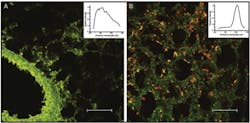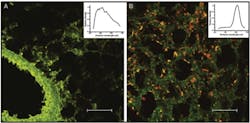Quantum dots increase uptake of cancer drug
Researchers at the University at Buffalo (UB) have developed a technology using quantum dots that promises major implications for research and treatment of tuberculosis and other inflammatory lung diseases. They linked quantum dots with doxorubicin, an anti-cancer chemotherapy drug, to target lung cells known as alveolar macrophages (aMOs), which play a critical role in the pathogenesis of various inflammatory lung injuries.
A paper in Nanomedicine: Nanotechnology, Biology and Medicine describes the study, which tested the ability of linked quantum dot-doxorubicin (QD-DOX) to decrease lung inflammation by delivering QD-DOX or doxorubicin alone to rats and mice (and then assessing damage to the lung). Doxorubicin, a frequently used cancer drug, is known to cause a variety of damaging immune responses in cancer patients. Results showed that QD-DOX increased uptake of the drug compared with doxorubicin alone. The researchers also demonstrated that the drug is released from the QD-DOX formulation once it is delivered into the targeted cell and still retains its bioactivity.
"Based on these results, we believe that linking quantum dots with therapeutic drugs may have tremendous potential...compared to other nanoparticle formulations, and should be further developed for lung pharmacotherapy applications," says Krishnan V. Chakravarthy, lead author on the paper.
More BioOptics World Current Issue Articles
More BioOptics World Archives Issue Articles

